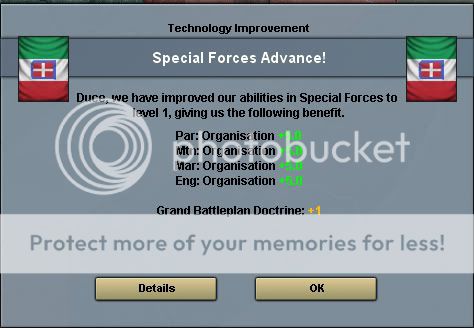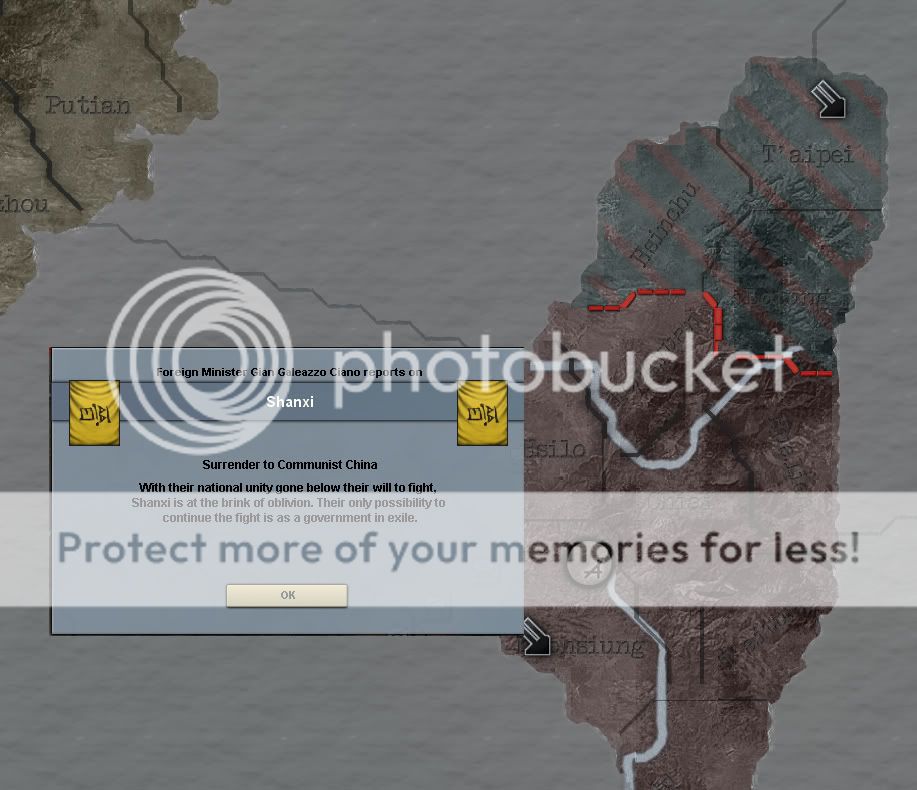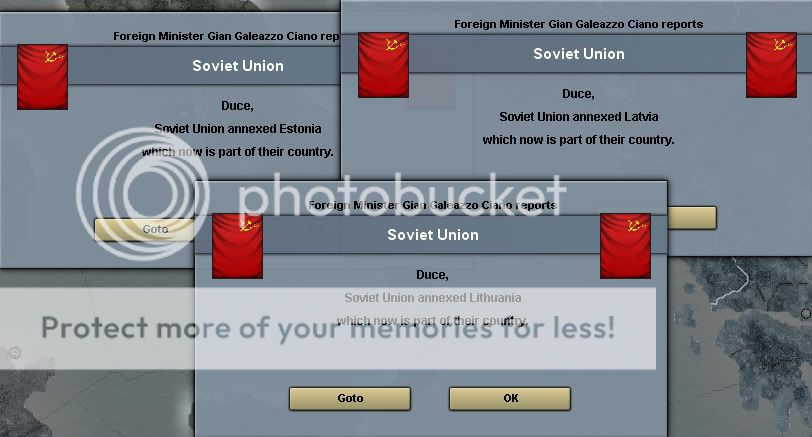The Year of Aggression
Part 2: Foreign Politics, January – June, 1939
Concurrently with the important technological and conceptual developments already mentioned occurred many significant events in international relations that shaped the direction the continent of Europe would take for the next several years. By the end of June, Europe would find itself on the verge of a revolution in geopolitics as the old order began crumbling under the weight of not one but two ascending new orders.
On the 11th of January, somewhat impatient for new victories and calculating that the Allies would let it by without overly much comment, Mussolini forced the annexation of Albania. This gave him a presence on the far southern Adriatic coast next to Yugoslavia and Greece. However, the annexation seems to have not been made for any clear strategic purpose: the port was too small to support any force larger than a corps at most, which had the potential of making Albania a glorified prison camp—such as Salonika had been during the First World War—rather than an important jumping off point for further operations. Albania’s neighbors did not react well to this move by Italy, nor did the British or the French. None of them, however, acted further than issuing notes of displeasure. Furthermore, the backlash united Italian opinion to a minor extent and contributed to a lowering of Italian neutrality.
Albania was annexed early in January.
At the same time this was happening, in the Far East, China was proving far more resilient than expected, given Japan’s recent successes in the north. Shanxi, which had fallen to the Japanese in late October or early November, was reconquered by the Communist Chinese by the 2nd of January. This, however, did not mark Japan’s nadir in China for three weeks later forces of the Guangxi Clique landed at Taipei and conquered the northern third of Formosa! It became evident to Mussolini that Britain would not be distracted overly much by Japan in the coming years, given its obvious incompetence against the Chinese.
Goings-on in China which were very detrimental to Japan, and indirectly to Italy
Events began hurrying by the end of April and the beginning of May. Germany invaded Poland, leading the Allies into war with Germany. Numerous countries in Europe mobilized upon this news. Switzerland led the way, mobilizing first, only a week into the war. Denmark followed suit a week after that. Finland, Luxembourg and Belgium mobilized in mid-June. Simultaneously, Italy began being embargoed by numerous states, given its friendly relations with Germany, even though Italy was as yet neutral. France led the way on this front with its announcement of embargo on the 10th of May, followed quickly by Britain within a week. Poland did so at the end of May, and Ireland and South Africa joined in late June. These embargoes did not affect Italy’s position much, as none of these countries ranked amongst Italy’s trading partners.
Embargo!
More worrisome than the embargoes was the growing strength of the Allies. Canada joined in early June, and Mexico in late June. If Germany anticipated waging economic warfare by attacking British convoys, the alliance of these two states to Britain made the Atlantic a much more dangerous place as it gave the British bases and forces to deploy in the north Atlantic, as well as the central Atlantic and Caribbean Sea. It would also complicate Italy’s own future naval strategies, once the Mediterranean was secure for many of the same geostrategic reasons. The Gibraltar Strait opened up into the Atlantic between Mexico and Canada, and with Britain looming over the shoulder of Europe. Nowhere would be safe for the Regia Marina, it would have to fight for command of the sea wherever it went. Mussolini was yet unsure whether the Regia Marina would be able to stand such stress for long.
Canada joining the Allies.
Finally, to complete the disarray of Europe, the Soviet Union swallowed the eastern half of Poland by mid-June, and had also annexed the three Baltic States of Latvia, Lithuania and Estonia. Though neutral in the war, they too were looming over Europe with an eye for taking territory where it could. The Finns, indeed, had begun mobilization in case the Soviets orchestrated any sort of provocations on the border. Furthermore, the Chinese Communists joined the Comintern late in June, thus giving the Soviets a diplomatic foothold in the Far East, and one more powerful than their enclave of civilization at Vladivostok.
The Baltic States were annexed by the Soviet Union.
The geopolitical situation in Europe was in complete chaos by the end of June. Europe was at war, its geography transformed. Albania, Poland, and the three Baltic States vanished from the map. Italy, Germany and the Soviet Union expanded by varying amounts, respectively. Europe was at war, Germany again the centerpiece of the conflict. This time, however, Germany was fighting a one front war; the Allies had rejected the prospect of invading Germany and forcing them to split their forces to actively deal with two threats at once. Both Italy and the Soviet Union were taking advantage of, and would take further advantage of, the chaos of this new European war to further their own aims.












